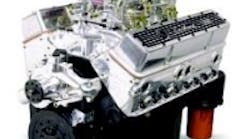There are signs that interest in manufacturing education is being revived, and that career and technical schools are facing a resurgence in interest from students.
In what was called a milestone in training employees for precision manufacturing, Donald Stegner, received in late August the first Journey-level Machinist Certificate based on an apprenticeship program led by the National Institute for Metalworking Skills.
Stegner is an employee of Penn United Technology Inc., a precision manufacturer based in Cabot, Pa. His certificate is based on an apprenticeship program that uses on-the-job and classroom training and testing, and confirms that he earned 12 credentials based on rigorous industry performance and knowledge standards established by the National Institute for Metalworking Skills.
Separately, the San Leandro High School, reopened its metal shop just in time for the start of the 2006 --2007 school year, after it had been closed for several years.
The shop closed because most of its equipment was old enough to be both out-of-date and in need of so many repairs that it wasn't worthwhile to keep it maintained.
A $75,000 donation from the Sheet Metal and Air Conditioning Contractors' National Association (SMACNA), and a expenditures made by its school district to renovate and purchase updated equipment led to its reopening, and it's now equipped with lathes and milling machines, sheet metal processing equipment and some woodworking equipment, now is in session again under the direction of shop teacher Dion D'Amico.
Another example is the opening of the expanded facility for the Precision Manufacturing Institute, based in Meadville, Pa., (www.pmionline.edu).
Jerry Knight, the executive director, told American Machinist that five, strategically-located training facilities such the Precision Manufacturing Institute could make a significant dent in the U.S. shortage of skilled manufacturing labor.
The Precision Manufacturing Institute opened its expanded facility in late spring, and attracted representatives from other U.S. states that are considering similar facilities.
It is a post-secondary, nationally accredited technical-training institute that offers instruction in metalworking, industrial maintenance, heating and air conditioning, electronics, welding and many more industrial areas. It is associated with Edinboro University of Pennsylvania, and its students are certified in their chosen fields and also graduate with as much as 26 hours of credit toward an associate college degree.
Students who pursue a career in manufacturing at PMI can choose from 28 diploma and certified programs. In addition, the school works with manufacturing organizations to provide them with customized training programs for their employees using the institute's state-of-the-industry equipment and software. In some instances, PMI will even conduct onsite training for manufacturers.
Training at PMI is a full-time job. Students attend 12-week programs, 8 hours a day, every day. When they graduate from the facility they carry a full toolbox, are National Institute of Metalworking Society (NIMS) certified and sport skills above those of an entrylevel employee. The institute has a 98-percent placement rate for its graduates.
PMI instructors come from industry and teach students in 10 classrooms in the 32,000-square-foot facility. The Institute has a large shop floor equipped with software, machine tools and other manufacturing equipment either donated or on loan. The equipment includes everything from single-spindle manual machines to multitasking systems, welders and electrical discharge machines (EDMs).
